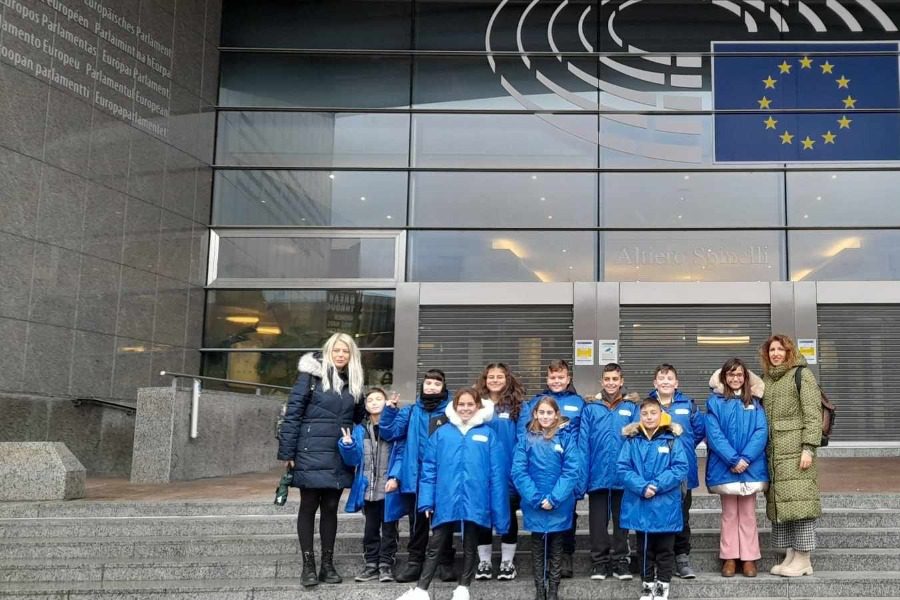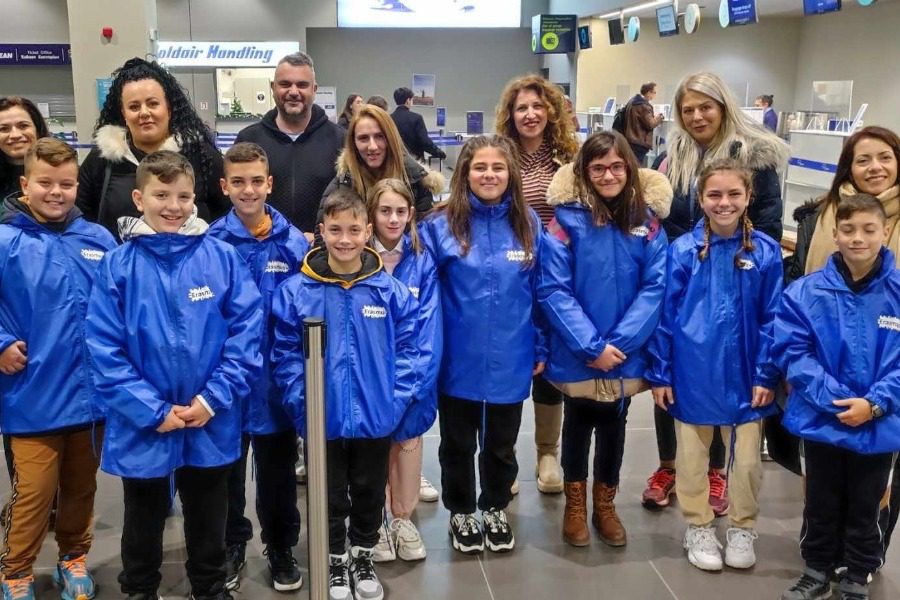Generation EUropeans - GenEUs
PRIMARY SCHOOL OF IPPEIOS, LESVOS, GREECE
The project aims to create an active,sustainable network to educate teachers and learners about the EU role and its history, the institutions, the way it functions and what the responsibilities and benefits of belonging to a wider community are. It will support teachers, primarily to discover EU related resources and tools in order to develop their own educational plan, and thus, be able to produce high-quality learning material. It will enable students to get acquainted with the European cultural heritage and to become more active EU citizens, as they will be introduced to the EU values, pillars, principles and objectives. We are committed to implementing the Sustainable Development Goals in all our school policies. The products of the project will be: training courses for teachers, study visits for learners, Open Days for the wider school community, newsletters and fanzines published at regular times, a project blog, as well as a teacher’s handbook and a kit containing teaching material, lesson plans and an inventory of useful links and tools. The school is situated on the borderline of Europe facing many socioeconomic challenges and being in the centre of the immigration crisis for many years, thus, it is of vital importance that the students are empowered with the EU ethics to avoid phenomena of xenophobia and radicalisation. The methodologies that will be used to implement the project will be age appropriate, such as project-based learning, inquiry-based learning and experiential learning techniques, followed by on-site research and study visits to EU institutions.
OBJECTIVES AND EXPECTED OUTCOMES OF THE PROJECT
- TO empower teachers to teach about the EU using engaging methods and to bring facts and knowledge about the European Union to their learners
- TO improve learning outcomes on EU matters
- TO strengthen EU literacy
- TO create interest in the European Union and constitute a basis to enhance participation of pupils and students in the democratic process and leave them better equipped to become active citizens.
ΒΑΣΙΚΟΙ ΣΤΟΧΟΙ ΤΟΥ ΠΡΟΓΡΑΜΜΑΤΟΣ
- να δοθεί στους εκπαιδευτικούς η δυνατότητα να διδάσκουν σχετικά με την ΕΕ χρησιμοποιώντας ελκυστικές μεθόδους και να παρέχουν στους εκπαιδευομένους τους στοιχεία και γνώσεις για την Ευρωπαϊκή Ένωση
- να βελτιωθούν τα μαθησιακά αποτελέσματα σε θέματα ΕΕ
- να ενισχυθεί ο γραμματισμός σχετικά με την ΕΕ
- να προκληθεί το ενδιαφέρον για την Ευρωπαϊκή Ένωση και να αποτελέσει τη βάση για την ενίσχυση της συμμετοχής των μαθητών και των εκπαιδευτικών στη δημοκρατική διαδικασία, ώστε να αποκτήσουν τα απαραίτητα εφόδια και να εξελιχθούν σε ενεργούς πολίτες.
Generation EUropeans - GenEUs
Το έργο στοχεύει στη δημιουργία ενός ενεργού, βιώσιμου δικτύου για την εκπαίδευση των εκπαιδευτικών και των μαθητών σχετικά με τον ρόλο της ΕΕ και την ιστορία της, τους θεσμούς, τον τρόπο λειτουργίας της, τις ευθύνες και τα οφέλη του να ανήκεις σε μια ευρύτερη κοινότητα. Το πρόγραμμα θα υποστηρίξει τους εκπαιδευτικούς, κυρίως για να ανακαλύψουν πόρους και εργαλεία που σχετίζονται με την ΕΕ, προκειμένου να αναπτύξουν το δικό τους εκπαιδευτικό σχέδιο, και έτσι, να είναι σε θέση να παράγουν εκπαιδευτικό υλικό υψηλής ποιότητας. Θα δώσει τη δυνατότητα στους μαθητές να εξοικειωθούν με την Ευρωπαϊκή πολιτιστική κληρονομιά και να γίνουν πιο ενεργοί πολίτες της ΕΕ, καθώς θα εξοικειωθούν με τις αξίες, τους πυλώνες, τις αρχές της ΕΕ μέσα από την εφαρμογή των Στόχων Βιώσιμης Ανάπτυξης, φέροντας αλλαγή στην πολιτική του σχολείου. Τα τελικά προϊόντα του έργου θα είναι: μαθήματα κατάρτισης για εκπαιδευτικούς, εκπαιδευτικές επισκέψεις για μαθητές, Ανοιχτές Ημέρες Γνωριμίας για την ευρύτερη σχολική κοινότητα, ενημερωτικά δελτία και περιοδικά που θα δημοσιεύονται σε τακτά χρονικά διαστήματα, ένα ιστολόγιο του έργου, καθώς και ένα εγχειρίδιο δασκάλου που θα περιέχει διδακτικό υλικό, σχέδια μαθημάτων και έναν κατάλογο χρήσιμων συνδέσμων και εργαλείων. Το σχολείο μας βρίσκεται στα σύνορα της Ευρώπης, που αντιμετωπίζει πολλές κοινωνικοοικονομικές προκλήσεις και στο επίκεντρο της μεταναστευτικής κρίσης για πολλά χρόνια, επομένως, είναι ζωτικής σημασίας οι μαθητές να ενδυναμωθούν με την ηθική της ΕΕ για την αποφυγή φαινομένων ξενοφοβίας και ριζοσπαστικοποίησης. Οι μεθοδολογίες που θα χρησιμοποιηθούν για την υλοποίηση του έργου θα είναι κατάλληλες για την ηλικιακή ομάδα τους, όπως η μάθηση βάσει έργου, η μάθηση βάσει διερεύνησης και οι τεχνικές βιωματικής μάθησης, ακολουθούμενες από επιτόπια έρευνα και εκπαιδευτικές επισκέψεις σε θεσμικά όργανα της ΕΕ.
Υπεύθυνοι εκπ/κοι : Καράμπελα Πηνελόπη, Τσακύρη Αγγελική, Καραφασούλης Στυλιανός
Visit our school website for more information on our EU Projects :
https://blogs.sch.gr/dimippeio/europaika-programmata/
Από τα θρανία στο Ίππειος, στα έδρανα των Βρυξελλών
Τα παιδιά και οι εκπαιδευτικοί της Ε' και ΣΤ τάξης του Δημοτικού ταξίδεψαν στην έδρα της Ευρωπαϊκής Ένωσης στο πλαίσιο του προγράμματος Erasmus+ Jean Monnet.
Από το NEWSROOM Δημοσίευση 18/12/2023

Η ομάδα GenEUs - Learning the EU του Δημοτικού Σχολείου Ιππείου, με μαθητές των ΣΤ' και Ε' τάξεων, ταξίδεψε στις Βρυξέλλες για εκπαιδευτική επίσκεψη, συγχρηματοδοτούμενη από το πρόγραμμα της Ευρωπαϊκής Ένωσης Erasmus+ Jean Monnet Learning the EU Initiatives for schools.
10 μαθητές, 2 εκπαιδευτικοί και 6 γονείς από τον Σύλλογο Γονέων & Κηδεμόνων επισκέφτηκαν το Ευρωπαϊκό κοινοβούλιο και το Σπίτι της Ευρωπαϊκής Ιστορίας, όπου είχαν την ευκαιρία να μάθουν τα πάντα για τα θεσμικά όργανα της ΕΕ και τον τρόπο λειτουργίας τους.

Ταξίδεψαν πίσω στο χρόνο σε όλα τα σημαντικά ιστορικά γεγονότα που γνώρισε η ευρωπαϊκή ήπειρος, τα οποία οδήγησαν στη συγκρότηση της ΕΕ και στη ζωή που έχουμε σήμερα.
Έκαναν ακόμη προσομοίωση μιας συνεδρίασης επιτροπής της ΕΕ για να συνειδητοποιήσουν τις δημοκρατικές διαδικασίες και είδαν στην πράξη μια πολυπολιτισμική κοινωνία να λειτουργεί και να ζει ειρηνικά, να εφαρμόζει πράσινες πρακτικές και να μοιράζεται κοινές αξίες.
BRAINSTORMING FOR THE 1st Year Activities
Suggestions for activities in order to create the Twinspace pages
Project Announcement
Project announcement on school websites and FB groups
Open Day at school
Presentation at seminars
Articles in local press
Leaflet
Project description and partner countries displayed on the EU Projects corner
Introducing the partners
Interactive map
A mural created with the country characteristics, eg. countries’ flags or national colors
AI pictures created to represent a country and then create a collage / Digital Museum
eTwinning code of conduct and Internet Safety ,netiquette, GDPR contracts
European Day of Languages celebration (online meeting on the 26th September)
record the word Europe in all the partner languages and create a wordcloud
Write words in own language on cards and try to guess the meaning and repeat
a Kahoot on languages/ Escape room
Cultural diversity in the EU ( customs and traditions, celebration of special EU days)
a Fobbiz book of customs and wishes
EU Timeline and the House of European history
Write a collaborative story on Europa and the bull (maybe use Storywizard,ai or other tools to generate pics) and add it to the official site
Common values and civic engagement - Celebrating the Year of Well-Being
podcast with tips for children’s rights,safety and well-being
Institutions and roles Participation in democratic life
symbols of the EU
digital journey to institutions and simulation of elections
https://digital-journey.europarl.europa.eu/#/en
https://360-experience.digital-journey.europarl.europa.eu/
Teachers’ portfolio - Handbook with lesson plans
Teachers’ EU Kit (useful resources and links for material will be running parallel to the rest of the activities)
A Symbaloo or padlet with the links
Fanzine about the EU - students’ articles
Use of Office Publisher or Canva for Education
Evaluation
evaluation for the final product
quizzes
wordcloud
survey
Dissemination (throughout the year)
Dissemination will be carried out using
the eTwinning platform
the website of the schools participating in the project
in-service training
Training seminars at regional level
exhibitions in schools
local papers
social media
Open Day for parents and the school community 11/9/2023 in the Primary school of Ippeios Lesvos
The leaflet was distributed to the event participants
ΕΠΙΣΚΕΨΗ ΣΤΟ ΕΥΡΩΚΟΙΝΟΒΟΥΛΙΟ ΣΤΟ ΣΤΡΑΣΒΟΥΡΓΟ
To Δημοτικό Σχολείο Ιππείου ταξίδεψε στο Στρασβούργο από τις 15/2/2025 έως τις 19/2/2025, με μαθητές των Ε΄και Στ΄τάξεων και 3 εκπαιδευτικούς, με σκοπό την επιμόρφωσή τους σχετικά με τον ρόλο της Ευρωπαϊκής Ένωσης και την ιστορία της, τους θεσμούς και τον τρόπο λειτουργίας της Ευρωπαϊκής κοινότητας. Το σχολείο υλοποιεί για δεύτερη χρονιά το έργο “Generation EUropeans” το οποίο συγχρηματοδοτείται από το πρόγραμμα της ΕΕ «Erasmus+ Jean Monnet Learning the EU Initiatives for schools». Στο πλαίσιο αυτό, μαθητές και εκπαιδευτικοί επισκέφτηκαν το Ευρωπαϊκό κοινοβούλιο, το κέντρο πληροφόρησης Europe Direct και το μνημείο-μουσείο αφιερωμένο στον Β’ Παγκόσμιο πόλεμο Memorial Alsace-Moselle. Παράλληλα η ομάδα περιηγήθηκε στον δρόμο του κρασιού της Αλσατίας με στόχο τον εντοπισμό και την καταγραφή των τοπικών ΠΟΠ προϊόντων. Στο πρόγραμμα συμμετείχε ομάδα εκπαιδευτικών και μαθητών του Πρότυπου Λυκείου Μυτιλήνης που επίσης υλοποιεί πρόγραμμα Jean Monnet, καθώς και του 4ου Δημοτικού σχολείου Λατσιών της Κύπρου.
Η εκπαιδευτική επίσκεψη βοήθησε στην ευαισθητοποίηση των μαθητών απέναντι στην πολιτιστική πολυμορφία και τις ευρωπαϊκές πολιτιστικές αξίες, καθώς και στο να γνωρίσουν καλύτερα την Ευρωπαϊκή ιστορία και τον πολιτισμό, τα οποία μελλοντικά θα ενισχύσουν την ενεργή συμμετοχή τους στη δημοκρατική διαδικασία και την απόκτηση δεξιοτήτων ενεργού πολίτη.
GenEUs 2nd Year implementation tasks
SEPTEMBER ACTIVITIES
Wellness week to kick off - Physical and emotional well-being tasks
Is the EU a happy place to live in? A survey to Think - Care - Share (inclusive, multicultural classroom)
"Think-Care-Share" techniques encourage students to think independently, show empathy, and collaborate with their peers. Here are some collaborative activities designed for elementary school kids using this approach:
1. Mindfulness Circle
Think: Students think about something that makes them feel calm or happy (e.g., a kind action or a moment of peace).
Care: They share this with a partner, listening carefully to each other’s experiences.
Share: The whole class sits in a circle and each student contributes their thoughts, creating a collaborative "mindful moment" or gratitude circle.
We share photos of our Mindfulness circle to make a collage
We craft problem-catchers to hide in the schools (problems come at any size, shape, color)
These activities not only foster collaboration but also help students practice empathy, active listening, and creative thinking.
OCTOBER ACTIVITIES
Geography and Culture - EU Country fact cards to create a board game
Nature journal printable collaborative book to record nature in each country
NOVEMBER ACTIVITIES
European Mythology, storytelling in the EU - creating our own myth to enhance a common European identity
DECEMBER ACTIVITIES
United in Diversity, European music, (carols and celebration symbols)
JANUARY ACTIVITIES
A treasure hunt in traditional products - Geographical Indication protection for local products
https://op.europa.eu/en/publication-detail/-/publication/8e570cb5-32b9-11eb-b27b-01aa75ed71a1
Have a sustainable picnic
Write a collaborative recipe book with a Waste food recipe section
FEBRUARY ACTIVITIES
Become Cyber Ambassadors - choose an ambassador from each school to form a youth advisory group
The EU strategy for a better Internet for kids and teens BIK+ - Organising Internet safety events
https://www.bikyouth.eu/resources
MARCH ACTIVITIES
Plastic is not fantastic - The Plastic Soup issue starts in your hands
Tasks to inform and raise awareness, the EU Green Deal- make your own video
APRIL ACTIVITIES
Do I have a voice in the EU? What’s in it for me? Children’s rights tasks
Create a poster of an iceberg, write what people let kids say on the top and what they would say if they were allowed a voice in the bottom
MAY ACTIVITIES
Dissemination activities
JUNE ACTIVITIES
Evaluation activities


.png)

